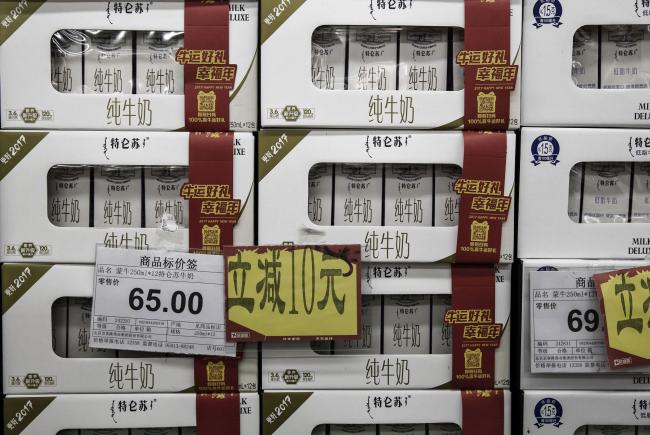(Bloomberg) -- China Mengniu Dairy Co. and Kirin Holdings Co. terminated their agreement for the sale of the Japanese company’s Australian beverage unit amid increasingly strained relations between Canberra and Beijing.
The announcement comes just days after the Australian Financial Review reported that Australian Treasurer Josh Frydenberg was planning to block the deal, despite Foreign Investment Review Board advice that it should be approved. The government has been tightening restrictions on foreign takeovers.
The companies reached a deal last year for the Chinese dairy giant to buy Kirin’s Lion Dairy & Drinks business for about 45.6 billion yen ($430 million). The companies said in separate statements Tuesday that they were ending the agreement as it hadn’t received regulatory approval.
Strained Ties
The scrapped deal is being viewed in local media through the prism of strained diplomatic ties between Australia and China. Relations between the two countries have been fraught since the government in Canberra barred Huawei Technologies Co. from participating in Australia’s 5G network. China also responded angrily after Australia’s push for an independent inquiry into the origins of the Covid-19 outbreak.
China has started an anti-dumping investigation into Australian wine, halted some beef imports and placed tariffs on Australia’s barley exports after the conclusion of an earlier anti-dumping probe. It has also cautioned its citizens against studying in or holidaying in Australia.
The collapse of the Kirin deal shows a reversal of sentiment from a year ago, when Mengniu won approval to buy organic infant formula maker Bellamy’s Australia Ltd. for A$1.5 billion ($1.1 billion). The Australian Competition & Consumer Commission said in February that it wasn’t opposed to the Kirin deal.
Australia announced on March 29 that due to the national security impacts of the coronavirus pandemic it would tighten restrictions on foreign takeovers, with all deals needing government approval, regardless of size.
On June 5, Scott Morrison’s government announced it would seek to implement permanent tougher screening measures on foreign investors seeking to buy sensitive assets from Jan. 1. Yet to be legislated, the changes would see telecommunications, energy, technology and defense-manufacturing companies be included in the zero-dollar threshold for screening.
Tougher Screening
The changes will include a new national security test and give the treasurer last-resort powers to force asset sales.
Australia isn’t alone in ramping up its foreign investment screening -- in recent years, economies including the U.S., Japan and the European Union have toughened their own laws to protect national security.
When asked on Aug. 20 about the Australian Financial Review article, Frydenberg said “the government does not comment on the details of foreign investment screening arrangements as they apply, or could apply, to particular cases.”
Mengniu has been eyeing overseas acquisitions as China’s appetite for milk grows with its middle class. At the same time, China has been seeking to boost the industry and restore confidence after a milk scandal in 2008 killed six children and poisoned 300,000 others.
Kirin shares were little changed in early trading in Tokyo on Tuesday.
“Although this was an unfortunate outcome, we’ll continue to discuss the best potential scenario for Lion,” a Kirin spokesman said.
(Adds more on Australian regulations beginning in third paragraph)
©2020 Bloomberg L.P.

